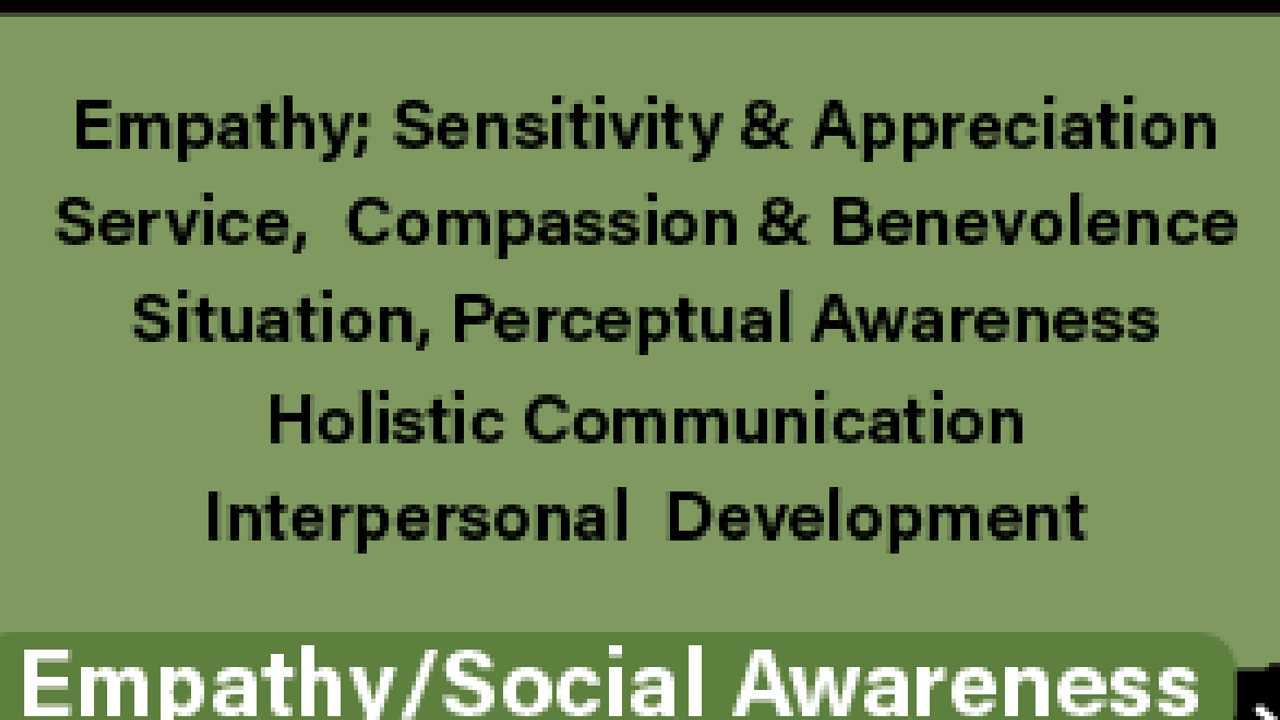
4 Components of Emotional Intelligence - Part 3 Empathy/Social Awareness
Emotional Intelligence or Emotional Intelligence Quotient (EI or EIQ) is a subject, in which most have not been adequately trained. As we proceed, please reflect upon how much training have you received in each of the four components of Emotional Intelligence? Do you have a comprehensive understanding of Self-Awareness, Self-Management, Empathy/Social Awareness and Relationship Management? To reiterate, most have had little to no training in these essential areas. You may wonder why we say essential areas.
Let’s take a moment to consider some facts:
- We all have feeling and emotions.
- There are times when our feelings and emotions can be negative and produce results that are detrimental to us and others.
- We all are involved in several relationships throughout our lives.
- These relationships are instrumental in determining happiness and the quality of our lives.
- These relationships bring varying degrees of responsibility.
- These relationships influence how both we and others think, feel and act.
In sum, our feelings and emotions influence or impact virtually everything, everyday:
- The way we think and make decisions
- How we act and interact with others
- How we respond to adverse situations and circumstances as they arise
Relationships influence and determine our happiness and the quality of our lives
I’ll refer to my colleague, Robert G. Jerus who defines EIQ as, “A set of emotional, social and relational skills that guides we perceive, understand and express ourselves, connect with others, manage interpersonal exchange, cope with challenges, and apply emotional information in an effective, meaningful way.”
That is a mouthful, but this definition underscores the importance of emotional intelligence and why everyone and the world needs it NOW! Perhaps the greatest omission of academia, parents, the faith-based community, government, and private industry has been the lack of the widespread teaching of EI to everyone. The stakeholders listed above have not always understood the importance of emotional intelligence. They did not have this knowledge and therefore could not give it. Leadership expert and best-selling author John Maxwell says, “You can’t give what you do not have.”
Prior to 1995, it was believed that Intellectual Intelligence (IQ) was the best indicator of one’s success in life. Science has proven since, that EI or EIQ is a much greater indicator of one’s potential and success. In fact, it is believed today that EI or EIQ account for as much as 80% of one’s success in life. In these prior years all focus was on high intellect rather than social or emotional skills. Is it a wonder why social skills have deteriorated to where they are now?
What was taught prior to 1995 and to some degree since was completely erroneous. We tend to pass on what we learn and are taught, whether it be right or wrong. For decades our focus was based on assumptions about IQ, rather than facts now known about the importance of EI. Imagine how not knowing essential facts, limit’s ability, and capacity for future growth. Let’s be mindful of the widely held belief prior to the days of Columbus, that the world was flat. Such thinking drastically limits possibility. The same is true with respect to erroneous thinking about IQ being the best indicator of one’s success. That thinking, has limited possibility as well. Fault premises, usually lead to faulty conclusions.
There is no way to quantify the irreparable damage caused by the faulty premise upon which so many were trained. What is important now however, is that we find ways to unlearn what was incorrect and begin learning and teaching what we now know to be correct. As we proceed to move forward in a post-Covid-19 world in which everything has or will continue to change at a pace faster and greater than at any time in the history of man, emotional intelligence skill sets will be required. Globalization, the continued rapid advance of technology, race relations, social injustice, political, cultural, or gender divisiveness, climate warming, poverty and pandemics and challenges to come, will require greater levels of EI or EIQ.
Increasing the world’s Emotional Intelligence is essential! It will prove to be the bedrock for the level of transformation needed to solve that challenges that threaten our ability to connect, communicate and collaborate. Increased Emotional Intelligence brings an increase in emotional capacity. When both emotional intelligence and emotional capacity increase, so does the ability to persevere through times of great adversity. When both increase so does the level of innovation and creativity.
Surviving and thriving in the 21st century will require comprehensive levels of each of the four components of emotional intelligence, greater mental toughness, resiliency, and lifelong learning. If we don’t have it, we can’t pass forward to our younger generations.
I close with a quote from Dr. George C. Fraser, “Many say the youth are our future, I say they are our present. If we don’t give them what they need now, there will be no future.”
Hopefully you now can appreciate why we at the EIQ-EICenter believe the world needs EI NOW! In subsequently blogs, we will continue sharing insights on this topic.

